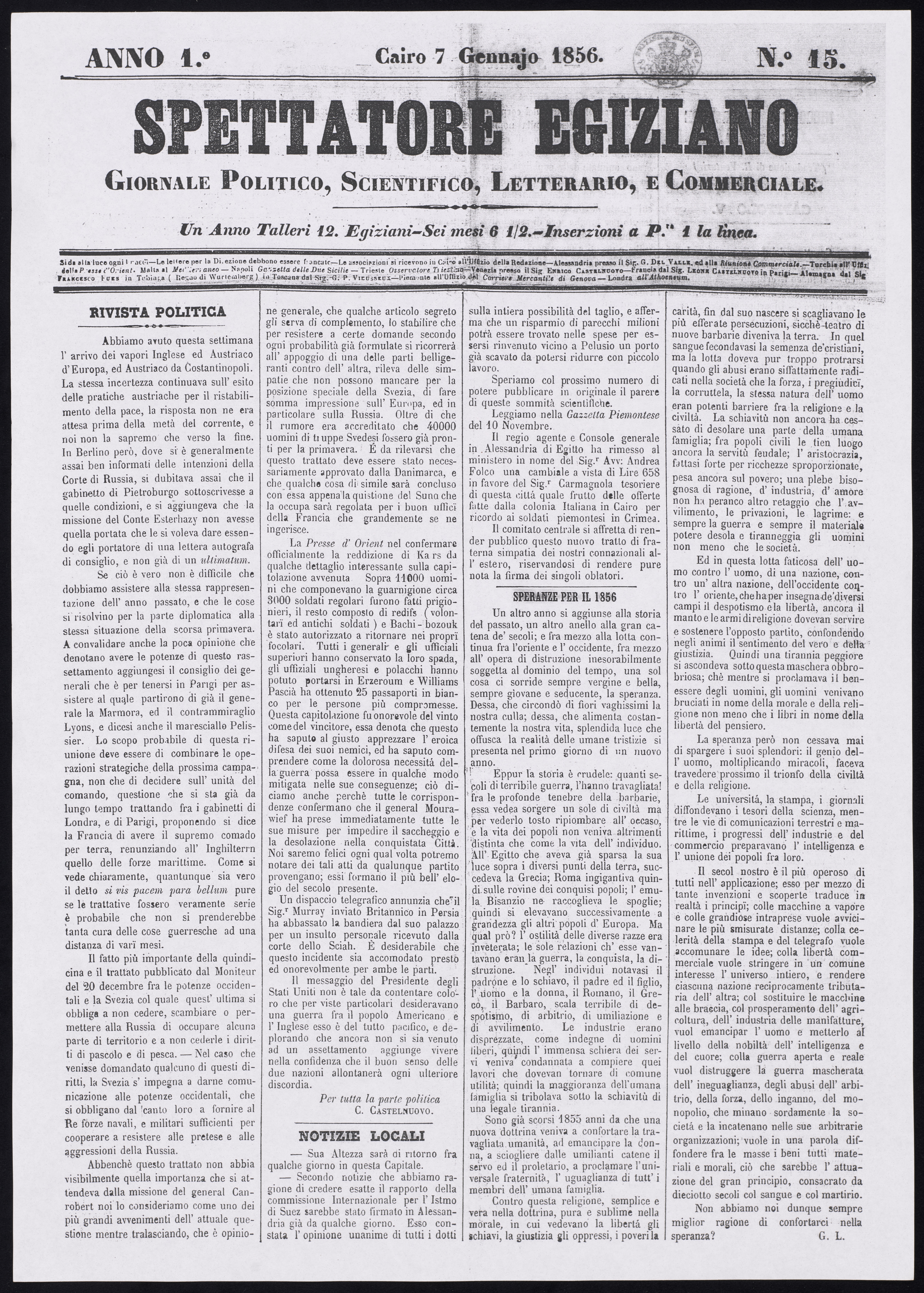7 January 1856: Sheet #1
Original title: spettatore-egiziano_0057.jpg

Transcription
Hope for 1856
Another year is added to the story of the past, another ring onto the great chain of centuries; and in the middle of the continuous fight between the east and west, in the middle of the work of destruction unavoidably subject to the dominion of time, one thing alone smiles at us. Always a virgin, always beautiful, always young and seductive: hope. This, which surrounded our cradle with the dreamiest flowers; this, which constantly nourishes our lives. The splendid light that obscures the reality of humanity's evils presents itself on the first day of the new year. And yet history is cruel: how many centuries of terrible war have tormented it! Among the profound darkness of barbarity, it sees a rising sun of civilization, but only to see it promptly fall again at dusk, and the lives of the peoples did not become otherwise distinct like the life of the individual. Onto Egypt, which had already spread its light to different points of the land, Greece occurred; Rome became enormous off of the destruction of conquered populations; its emulator Byzantium collected the remains; so the other populations of Europe gradually elevated themselves to prominence. But to what end? The hostility of different races was ingrained; the only affairs that they praised were war, conquest, and destruction. Of the noteworthy individuals are master and slave, father and son, man and woman, the Roman, the Greek, the Barbarian, a terrible extent of tyranny, of free will, of humiliation, and of despondency. Industries were despised, as unworthy for the free man, so the immense multitude of slaves were condemned to carry out the work that was supposed to be of common benefit. The majority of the humankind, therefore, suffered under the slave system of a legal tyranny. 1855 years have already passed since a new doctrine came to comfort troubled humanity, to emancipate women, to release slaves and proletarians from their humiliating chains, to proclaim universal brotherhood and equality for every member of humankind. Against this religion–simple and true in its teachings, pure and sublime in its morals, in which slaves saw freedom, the oppressed saw justice, the poor saw generosity–the most heinous persecutions have been thrown since its inception, so the land become a theater for new barbarity. The seed of Christians fertilized itself in that blood, but the fight unfortunately had to continue when the abuses were so rooted in society that the forces, the prejudices, the corruption, the very nature of man were powerful barriers between religion and civilization. Slavery has not yet ceased to devastate a piece of humankind. Among civil populations there is still feudal servitude; the aristocracy, made strong by disproportionate wealth, still weighs on the poor; a plebeian, in need of reason, of industry, of love, still does not have other inheritance besides despondency, deprivation, and tears: war and material power always devastate and oppress men no less than society. And in this tiring fight of man against man, of one nation against another nation, of the west against the east, that has despotism and freedom as symbols in different fields, the cloak and the weapons of religion again must serve and sustain the opposite party, creating confusion of the feelings of truth and of justice in the people's souls. So a worse oppressive power hid itself behind this despicable mask. While it proclaimed the well-being of men, these men were burned in the name of morality and religion no less so than books were in the name of freedom of thought. Hope, however, never ceased to spread its splendor: the genius of man, through its multiple feats, foretold the coming triumph of civilization and of religion. Universities, the press, and the newspapers broadcasted the treasures of science, while the means of communication by land and by sea and the advancements in industry and business prepared the intelligence and the union of their populations. Our century is the most industrious of all in practice. Through many inventions and discoveries, it transforms principles into reality. With steam machines and grand undertakings, this century wants to move closer to limitless distances. With the speed of the press and of the telegraph, it wants to pool its ideas; with its commercial freedom, it wants to join the entire universe in a common interest and make each nation a mutual tributary to the others. In replacing manual labor with machines, in the prosperity of agriculture and the manufacturing industry, this century wants to free man and put him at the level of nobility in intelligence and in heart. With open and real war, it wants to destroy the masked war of inequality, of the abuses of free will, of force, of deceit, of monopolies, all of which subtly undermine society and chain it to arbitrary organizations. In short, this century wants to diffuse material and moral goods across the masses which would be the realization of the great principle, consecrated for eighteen centuries with blood and martyrdom. Do we not, therefore, always have a good reason to comfort ourselves with hope?